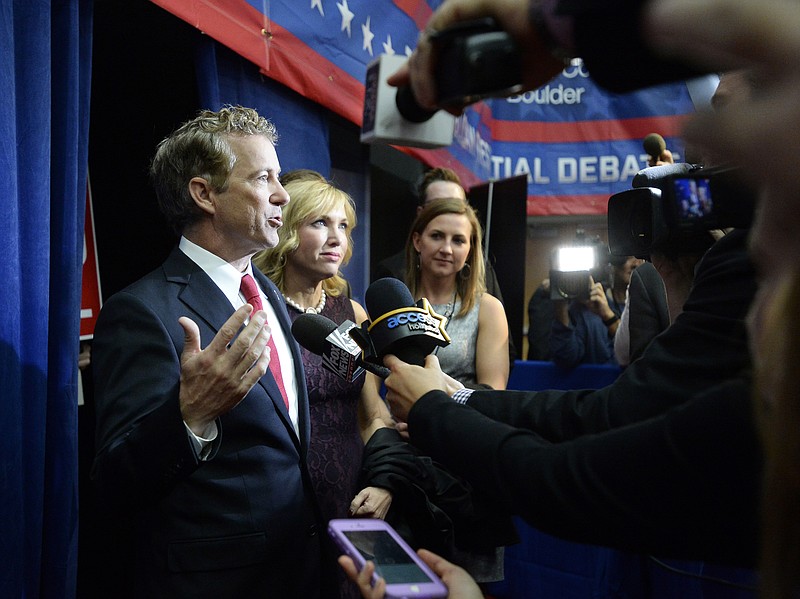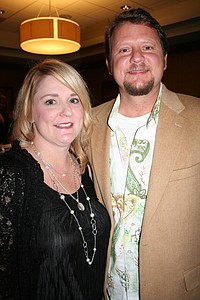Photo Gallery
Book Release Party
A party held for the "Life-Onomics" wealth/stress management book release at Crowne Plaza in Little Rock, November 15.
In late September, a Gallup poll said trust in the mass media had tied an historical low.
In the poll, only 40 percent of Americans said they had "a great deal" or "a fair amount" of trust and confidence in the mass media to report the news fully, accurately and fairly.
The mark tied previous lows set in the election years of 2012 and 2014 and was a significant drop from a high of 55 percent in 1998 and 1999.
The goal for the media should be to present the news impartially to give readers, listeners or viewers a fair representation of what they were not there to see or experience.
News coverage of last Tuesday's 2016 Fox Business Network Republican presidential debate is one example of how that's not being done - and a telling one.
Below are several biased written descriptions of the debate (and the reality of what actually happened):
* New York Times: "After weeks of personal sniping, the Republican presidential candidates clashed sharply over immigration and other policies at their debate."
Reality: The discussion on immigration occupied only a small portion of the debate, which focused on economy. The campaign has seen no more "personal sniping" than any other campaign that started with 17 candidates trying to distinguish themselves and certainly no less "personal sniping" than the Democratic campaign.
* Time: (Headline) "Why the GOP Debate Didn't End the Party Crisis" - "Strap in. Any predictions the Republican primary would lose its drama soon seem to be foolhardy. [The debate] also revealed deep divisions among Republicans. It will fall to voters to suss out what kind of person they want to put forward as the standard bearer of a party that has not won a national election since 2004."
Reality: The Republican Party has no crisis, only diversity that Democrats, most of whom have careened far to the left, could only wish for. A campaign, after all, is where differences are aired, but the GOP's are hardly "deep divisions." And a party "that has not won a national election since 2004" has not won a national election only for the presidential term of one man.
* Washington Post: "The fourth GOP presidential debate revealed deep splits among the eight candidates on the stage, especially on the subject of foreign policy."
Reality: At least seven of the eight candidates on stage Tuesday believe in a very similar foreign policy - they're hardly deeply split - but are nuanced in how they would handle various interventions. The eighth, Sen. Rand Paul, is more isolationist.
* ABC: " [T]he broad contours of the presidential race were somehow brought into sharper relief by an evening that was often dull. Talk of immigration, foreign policy and bank bailouts was a throwback for a Republican Party that's been rocked by sideshows, surprises, and campaign drama."
Reality: If a presidential race can be brought "into sharper relief" by one debate, how dull can the evening be? Meanwhile, immigration, foreign policy and bank bailouts have been among the topics of discussion at all four Republican debates, despite the "sideshows, surprises and campaign drama" that are a hallmark of every presidential race.
* Huffington Post: " In stark contrast to the first three GOP face-offs, each of which carved an underlying narrative that drove subsequent news coverage, Tuesday's forum had many moments that stuck out. The big melee between Donald Trump and Ben Carson that many had expected never materialized."
Reality: The three previous debates were just that - debates. Any "underlying narrative that drove subsequent news coverage" was simply the scenario the news organization wanted to spin. And "the big melee between Donald Trump and Ben Carson that many expected" was only expected by those covering the debate, not the candidates involved.
* New Yorker: "Fresh from providing a welcome boost in the ratings for CNN, CNBC, and 'Saturday Night Live' the 2016 Republican primary process rolled into downtown Milwaukee on Tuesday. Together, the three moderators oversaw a lively, if not always informed, debate. At times, matters of real substance intruded on the rote recitations of Obamaphobia and supply-side economics. There was even a discussion of too-big-to-fail banks and how to prevent a repeat of the collapse of 2008. It wasn't a particularly coherent discussion, to be sure."
Reality: Since when are programs that provide ratings boosts for networks something at which to sneer? Certainly, CNN, CNBC and "SNL" are reaping the monetary benefits. An honest discussion of the missteps of the last seven years is hardly "Obamaphobia." A "discussion of too-big-to-fail banks and how to prevent a repeat of the collapse of 2008" will never be "particularly coherent" if the candidate the media organization prefers is a crony capitalist cozy with Wall Street's biggest banks.
Given the above examples in supposedly unbiased mass media outlets, it's no wonder Americans have the opinion they do.
Read more
* Sohn: The presidency is not an entry-level political job * Krauthammer: The most revealing debate yet * Cooper: GOP debate finally all business * Debate day-after: What rivalries? GOP candidates play nice * Debate takeaways: Candidates dive into immigration, spending * Fact check: In Republican debate, flubs and funny numbers * GOP presidential debate updates * Bush, Carson seek to steady campaigns in GOP debate* GOP candidates oppose raising federal minimum wage* Christie focuses attacks on Clinton in GOP undercard debate * Protesters rally in Milwaukee during GOP debate * Smaller cast of Republican candidates face off in debate

